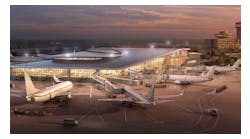Huntsville International Airport will continue to uphold a mandatory mask policy even after the state of Alabama lifts the mask mandate that requires people to wear masks in public whenever they are within 6 feet of someone else from a different household. President Biden's Executive Order on promoting COVID-19 Safety in Domestic and International Travel by requiring travelers to wear face masks when they are in airports, bus and rail stations, as well as while on passenger aircraft, public transportation, passenger railroads, and over-the-road buses operating on scheduled fixed-routes went into effect on Feb. 2 and does not end in conjunction with the state of Alabama's mandate.
"The airport's policy will extend beyond April 9th and be upheld as long as a federal law requires the airport to do so," said Cooper Jacob, public relations at Huntsville International Airport. "We want to remind the flying public that just because masks aren't mandatory elsewhere, they should still be prepared to wear them at the airport due to federal law."
The federal face mask requirement extends to the nation’s domestic network of airports; passengers and crewmembers flying aboard airplanes operated by domestic and foreign air carriers with inbound flights to U.S. ports of entry; and surface transportation modes, such as passenger rail, bus systems, and over-the-road bus companies. Passengers without a mask may be denied entry, boarding, or continued transport. Failure to comply with the mask requirement can result in civil penalties.
Regarding the civil penalty fine structure for individuals who violate the Security Directive, the Transportation Security Administration (TSA) will recommend a fine ranging from $250 for the first offense up to $1,500 for repeat offenders. Based on substantial aggravating or mitigating factors, TSA may seek a sanction amount that falls outside these ranges. TSA has provided transportation system operators specific guidance on how to report violations so that TSA may issue penalties to those who refuse to wear a face mask.
According to the CDC Order, face masks should cover the nose and mouth and fit snugly against the sides without gaps. Masks can be either manufactured or homemade and should be a solid piece of material without slits, exhalation valves, or punctures. While medical masks and N-95 respirators fulfill CDC and TSA’s requirements, face shields and/or goggles are not an acceptable substitute for the use of a mask; however, they may be used in addition to an acceptable mask.


